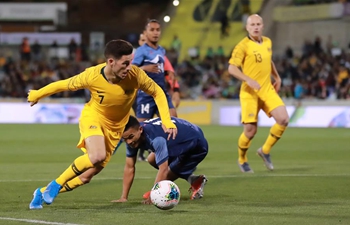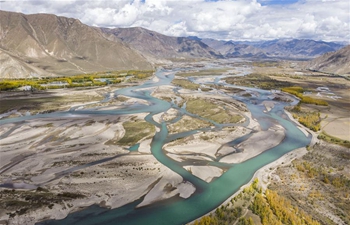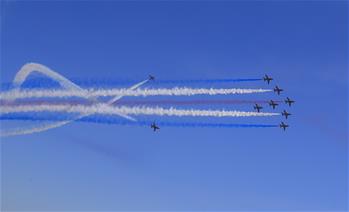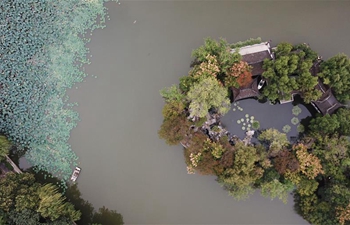
A Palestinian fisherman catches fish in the Mediterranean sea in Gaza City, Oct. 10, 2019. In the Gaza Strip, some fishermen resort to primitive methods of spearfishing to challenge Israel's maritime restrictions imposed on them. (Photo by Rizek Abdeljawad/Xinhua)
GAZA, Oct. 11 (Xinhua) -- In the Gaza Strip, some fishermen resort to primitive methods of spearfishing to challenge Israel's maritime restrictions imposed on them.
After finding best locations, the fishermen free-dive into the sea with their spearguns in search for fish.
Spearfishing is an ancient method of fishing that has been used throughout the world for ages as early civilizations were familiar with the custom of spearing fish from rivers and streams using sharpened sticks.
In Gaza, diving for catching fish is an adventurous risk as the fishermen lack diving tools such as wetsuits, goggles, oxygen tanks or breathing tubes.
In addition to reducing fishing areas, Israel also banned the entry of diving equipment into the Gaza Strip since it imposed a blockade on the seaside territory after Hamas movement's fighters seized control of the enclave by force in 2007.
Under the Oslo peace agreement signed between Israel and Palestine Liberation Organization in 1993, Palestinian fishermen are allowed to fish in an area of 20 nautical miles (37 km).
But Israeli navy has reduced the fishing zone down to six miles (9.66 km), and sometimes to only three miles (4.83 km) offshore, since Hamas's takeover of Gaza.
Israel said it imposed the maritime blockade in order to staunch arms smuggling into the coastal enclave.
Although Israel sometimes eases its security restrictions imposed on fishermen off the Gaza coast, Palestinian fishermen complain that the relaxation is not enough as fish live offshore 15 miles (24.14 km).
Adventurous fishermen usually observe the weather on a daily basis, as well as the sea waves so that they know when they can dive.
Using his small boat, Abdul-Karim Sleim, 28, a resident of Deir al-Balah in the central Gaza Strip, heads to the southern area of the sea in Khan Younis and Rafah cities to search for clear areas where he can see the fish that gather around the rocks.
After an hour of search, Sleim anchored his boat, wore unmatched fins and swimming goggles, held his speargun and leapt into the water.
Two minutes later, Sleim showed up with a big seabass fish in his speargun.
"Our day began with a good catch, we will make good money today," Sleim said with a smile, noting that the species of fish were abundant in that location.
In his first round of fishing, which lasted for two and a half hours, Sleim managed to catch 4 kilograms of various fish. He sold them to a trader for 25 Israeli shekels (7.12 U.S. dollars) per kilo.
"I prefer to catch big fish, because they are more profitable than smaller ones," he said, noting that traders who buy the big fish from him export them to Israel and the West Bank because of their scarcity and large size.
"The world of the sea is a world of abundant profit if we can cross miles beyond those imposed by Israel. But we always find alternatives so that we can create our own business and get money," Sleim added.
Sleim, a father of one child, works as a diving instructor along with fishing. He said that he can't rely on fishing alone, so he works as a diving instructor.
Meanwhile, Sleim's friend Mahmoud al-Aqraa, 21, is not lucky enough to catch big fish, but he believes that spearfishing is good alternative to seasonal fishing with nets.
"Fishing nets pile up in their places in the sea ... we are unable to use them as a result of the Israeli naval blockade," he said.
As for the difficulties faced by the adventurous fishermen, al-Aqraa said free-diving for spearfishing is so dangerous, noting that a simple mistake may cause a "catastrophe."
"The lack of diving and fishing equipment caused by the Israeli blockade makes things more challenging and dangerous for us," the breadwinner of 11 family members told Xinhua.















